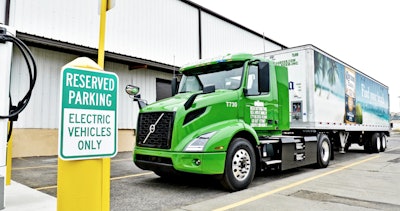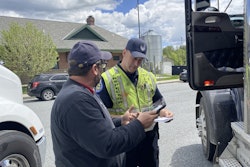
Trucking news and briefs for Wednesday, June 25, 2025:
Trucking org challenges California’s emissions deal with OEMs
The Western States Trucking Association has filed a petition with California’s Office of Administrative Law (OAL) challenging the Clean Truck Partnership (CTP) between the California Air Resources Board (CARB) and truck manufacturers.
In the wake of Congress disapproving of the Environmental Protection Agency’s waivers for CARB’s Omnibus Low-NOx and Advanced Clean Trucks. (ACT) regulations, WSTA believes CARB cannot require manufacturers to comply with the CTP, as CARB no longer has authorization from the EPA to enforce the Omnibus and ACT regs.
WSTA’s petition claims that the CTP “is an improperly adopted ‘regulation’ under California's Administrative Procedure Act (APA)” that “applies generally to all manufacturers of internal-combustion powered on-road heavy-duty trucks and engines and requires those companies to follow CARB regulations even when those regulations have no federal authorization.”
The organization says that an OAL determination on the legality of the CTP “is of vital public interest and importance to all Californians, and it is necessary to ensure that stakeholders can publicly participate in the development of rulemaking that impacts heavy-duty truck and engine availability and prices in California.”
Since the passage of the Congressional Review Act disapprovals, CARB has indicated that it will still hold manufacturers to the CTP. Because of this, WSTA says CARB is treating the CTP as a regulation that is subject to the Administrative Procedure Act.
“Framing the CTP as a contract with private parties does not exempt the CTP from being a regulation of general applicability subject to the APA,” WSTA said. “Both California law and general principles of administrative law dictate that a government agency may not use an agreement with a regulated party to avoid the APA requirements associated with rulemaking.”
In contending that the CTP is actually a regulation rather than just an agreement, WSTA said CARB didn’t follow APA procedures in promulgating the CTP, including filing a copy with the Secretary of State of California and providing notice and the opportunity for public comment.
[Related: Clean Truck deal architect says emissions pact with OEMs 'going forward']
Torc launches new innovation center in Michigan for autonomous development
Autonomous truck tech developer Torc, a subsidiary of Daimler Truck, has established a new engineering center in Ann Arbor, Michigan, that Torc said “will further accelerate the company’s productization efforts and tap into the region’s rich automotive and technology talent pool.”
As part of its effort to open the Ann Arbor location, Torc worked closely with the Michigan Economic Development Corporation to secure incentives to support the expansion into Michigan, as Torc plans significant hiring in this region to grow its team and technical talent capabilities.
Torc’s Ann Arbor site will help drive critical product milestones, the company noted. A diverse range of engineering roles will be based in the office, including expertise in machine learning, software, hardware, and systems engineering, alongside positions in product engineering, safety, and other key functions.
"This strategic location is a natural fit for Torc as we continue to advance our autonomous technology,” said Jamie Swaim, Chief People Officer at Torc. “Ann Arbor’s proximity to the Detroit automotive industry and a wealth of high-tech talent, combined with the exceptional concentration of high-caliber universities and colleges, makes it an ideal environment for our growth and productization strategy. This new center will complement the strong engineering talent we already have across the nation."
The new office, located in northeast Ann Arbor, will encompass approximately 32,000 square feet and will feature multiple collaboration spaces and hardware in the loop labs.
[Related: How autonomous trucks will impact the trucking workforce]
Senate version of bill to increase dry bulk weight variance introduced
A piece of companion legislation to go along with a trucking-related bill introduced in the U.S. House in April has now been introduced in the Senate. That bill, the VARIANCE Act (or Vehicle Axle Redistribution Increases Allow New Capacities for Efficiency Act), would allow a 10% axle weight variance for commercial motor vehicles transporting dry bulk goods.
The House version was introduced earlier this year by Reps. Rick Crawford (R-Arkansas) and Salud Carbajal (D-California). Now in the Senate, Sens. Pete Ricketts (R-Nebraska) and Adam Schiff (D-California) have introduced the bill.
“This is common-sense policymaking,” said Ricketts. “Allowing flexibility for truckers with naturally shifting goods will help improve efficiency and safety in Nebraska’s agriculture industry. American truckers want to carry the same sized load in loose dry bulk that they can for any other freight. This bill is a win for every step along the supply chain.”
Ultimately, the bill would grant a 10% axle variance for trucks transporting dry bulk goods and increase the maximum weight on any tandem-axle trailer to 37,400 pounds. The maximum laden weight for the entire tractor-trailer unit would remain untouched at 80,000 pounds.
As of June 24, the House version of the bill is awaiting action in the Subcommittee on Highways and Transit, and the Senate version has been referred to the Committee on Environment and Public Works.
New electric truck charging depot in development at Port of Oakland
Heavy-duty electrification services provider WattEV has broken ground on its sixth heavy-duty electric truck charging depot in California, located at the Port of Oakland.
This new charging depot will establish a zero-emission freight corridor from the Bay Area to Sacramento, Nevada and beyond, the company said.
“We’ve been working towards opening a Northern California charging depot for several years,” said Salim Youssefzadeh, CEO and co-founder of WattEV. “Until now, most truck charging infrastructure has been concentrated in Southern California. This project marks a significant milestone for WattEV, the Bay Area, and California’s zero-emission freight future.”
WattEV’s public charging depot will be capable of charging 25 medium- and heavy-duty electric trucks concurrently at up to 240KW each or six trucks at 1.2 MW. The depot is designed for megawatt charging, reducing charging “dwell times” to 30 minutes or less, comparable to diesel refueling times, the company added.












